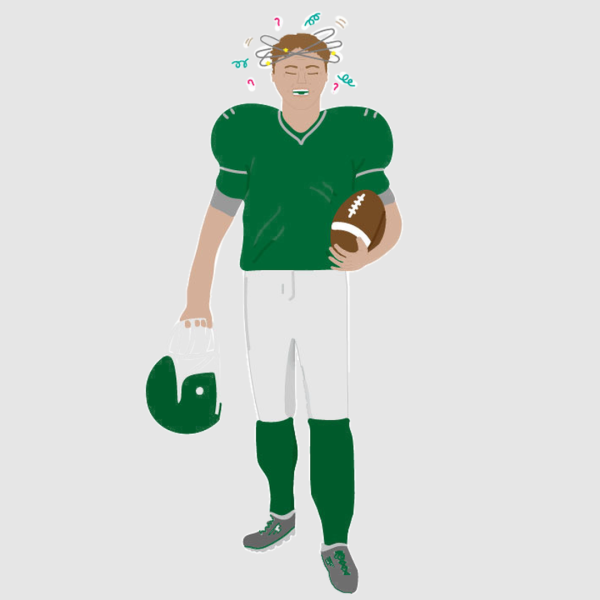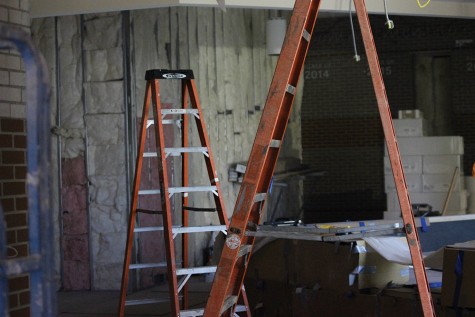Editor recounts battle with depression
“What happened to your leg?” asks a senior girl, now a former student. I quickly throw out a lie and say I slipped while shaving. She doesn’t press the issue, believing me. This is the first of many times I will lie about the cuts on my arms, legs and hips. And the Band-Aid wrappers littering my room.
I was excited for sophomore year. I filled my schedule with intense, advanced classes. I ran my hardest every day at cross country practice, getting better and better. I thought I could do it all.
Not long after school started, I took a turn for the worst. I was struggling at home to get along with my family and struggling at school to find where I fit in.
Between the pressure from external factors and my own internal voice, I started to feel like my life was out of control. My parents wanted me to get straight A’s, my classmates wanted to make fun of me and I wanted to be perfect.
I started isolating myself from my friends and family. I didn’t want to get up in the morning, although I forced myself to. On the weekends, I opted to stay home and sleep rather than go hang out with friends. Eventually, I resorted to self-harm to handle my emotions. I needed to feel in control, and the cuts on my skin were the only things I had complete control over. I was depressed.
My perfectionist personality made it difficult for me to give up completely. I tried and tried to make myself stop caring about my grades and everything else, but no matter how bad I felt, I still cared.
Ultimately, my inability not to care is probably what saved me. I knew what I was doing to myself was not okay and that I needed help. I was miserable with how I went through each day, but trying to work through the depression seemed daunting.
One day in October of my sophomore year, I finally worked up the courage to speak up. I went to my cross country coach’s office and told him everything. He was understanding and took me to the school social worker, who called my dad.
My dad handled the news very well, all things considering. He helped me find a therapist I was comfortable talking to, and he drove me to my weekly appointments. He even rushed home one day from work to take care of me after I called my sister, sobbing hysterically and scared because of all the blood coming from my fresh cuts.
Opening up about being depressed was one of the hardest things I’ve ever had to do. Dealing with my family once they knew wasn’t easy either. I was extremely uncomfortable talking about my depression, and it was even more painful to discuss the self-harm.
I blame my own difficulty speaking up on the lack of open conversations about mental illnesses. Talking about what it means to be mentally ill in school and at home would change the way society views mental illnesses. There would be less stigmatizing and more acceptance.
It’s been almost a year since I last cut myself. The exact date is Dec. 1, 2014.
That doesn’t mean that I’m happy 100 percent of the time or I never think about cutting, because I do, but I’ve learned how to cope.
I exercise almost everyday to manage stress and to improve my mood. At one point, my family thought I had an eating disorder because I spent so much time at the gym. However, working out has always been my outlet, and when I was in the midst of the worst of the depression, going to the gym kept me sane, or, at the bare minimum, controlled.
My support system played a key role in my recovery. At first, I kept the depression a secret from everyone except for the initial people who knew—my coach, family and one friend. But then, I slowly started to reach out to one person at a time, and, while still small, my support system grew into a community of some of the most loving people I know.
Despite the support, I still deal with the stigma of mental illness on a regular basis. Most of the comments I receive are unintentionally hurtful and show a lack of understanding.
I’ve had members of my support system blame me for my depression. They have told me that I can control feeling depressed. However, anyone who has struggled with depression knows it is not controllable. Depression comes and goes as it pleases. Stigmatizing individuals with depression or any mental illness is not okay. Behind every stigma is an ignorant, scared person.
For instance, one of the first people I told about my cutting initially seemed incredibly supportive. He told me to call him anytime I felt the urge to cut. The first few times I reached out to him during one of my destructive episodes, he was great. But after that, he started to get angry with me.
He said I was putting my depression on him. Which, yes, I probably projected my pain on to him a little too much. While the things he said to me about my illness hurt at the time and still do, I know it wasn’t his fault. He wasn’t equipped to handle the extremes I was experiencing. However, his actions did show how little even the most well-meaning people can know about depression and mental illness as a whole.
Ultimately, I hope that by talking about mental illness more people will be inclined to be open about what they may be going through. Mental illnesses are nothing to be ashamed of. I am not ashamed to admit that I struggle with depression, and I hope someday others won’t be either.
I’ve had my share of struggles. I’m not going to lie. It isn’t easy, and it never will be. I will fight my tendency to gravitate toward depression for the rest of my life. I may be depressed, but my depression is not who I am.
Your donation will support the student journalists of Lawrence Free State High School. Your contribution will allow us to purchase equipment and cover our annual website hosting costs.









